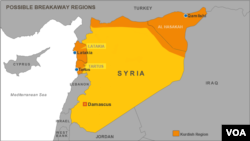Syria's opposition coalition named a veteran dissident Monday as its interim leader.
George Sabra, who was jailed several times for opposing the regimes of Syrian President Bashar al-Assad and his father, will retain the caretaker position until an opposition group meeting set for May 11.
Sabra appealed at a news conference in Istanbul for increased global support for the rebel cause. He replaces Mouaz al-Khatib who resigned in March while complaining that the international community has not done enough to help the Syrian people.
Also Monday, European Union governments agreed to ease sanctions against Syria in order to allow crude oil purchases from opposition forces in hopes of providing a financial lifeline to rebels fighting the Assad government.
Under Monday's decision, European importers will be allowed to buy oil from facilities in rebel-held Syrian territories and also to export oil production technology and investment cash to the rebel-held areas, if authorized by Syria's opposition National Coalition.
The EU sanctions were first imposed in 2011 in response to Assad's brutal crackdown on pro-democracy protests.
Syrian activists and rebel fighters said on Monday that a six-day government offensive on a mostly Sunni area near Damascus has killed at least 100 people and possibly many more. The death toll could be the largest from a single military campaign in almost a year.
The exact number of dead in the districts of Jdaidet Artouz and Jdaidet al-Fadel could not be confirmed. The two adjacent neighborhoods are about 15 kilometers southwest of Damascus.
The Britain-based Syrian Observatory for Human Rights said activists had documented 101 dead in Jdaidet al-Fadel, including 10 women and three children. But the Observatory said the actual number killed could be as high as 250.
Another activist group, The Local Coordination Committees, put the death toll at 483. It said most of the victims were killed in Jdaidet Artouz.
Activist videos posted on the Internet claimed to show several bodies of those killed covered in bags and laid out on the ground. Some appeared to have been executed with gunshot wounds to the head.
Syria's state-run SANA news agency said government troops had "inflicted heavy losses upon terrorists in the town of Jdaidet al-Fadel." Syrian authorities refer to those fighting to end President Assad's rule as "terrorists."
British Foreign Secretary William Hague said the reports of the massacre underline the urgent need to bring Syria's war to an end.
Meanwhile, the Syrian army continued its offensive near the Lebanese border around the western rebel stronghold of Qusair, with the help of pro-government militia and Lebanese Hezbollah militants.
Hezbollah, a key Assad ally, has denied sending its fighters to Syria.
Human Rights Watch on Monday called on both Syrian government and rebel forces to end "indiscriminate cross-border attacks" on areas in Lebanon, warning they violate international law.
Some information for this report was provided by AP, AFP and Reuters.
George Sabra, who was jailed several times for opposing the regimes of Syrian President Bashar al-Assad and his father, will retain the caretaker position until an opposition group meeting set for May 11.
Sabra appealed at a news conference in Istanbul for increased global support for the rebel cause. He replaces Mouaz al-Khatib who resigned in March while complaining that the international community has not done enough to help the Syrian people.
Also Monday, European Union governments agreed to ease sanctions against Syria in order to allow crude oil purchases from opposition forces in hopes of providing a financial lifeline to rebels fighting the Assad government.
Under Monday's decision, European importers will be allowed to buy oil from facilities in rebel-held Syrian territories and also to export oil production technology and investment cash to the rebel-held areas, if authorized by Syria's opposition National Coalition.
The EU sanctions were first imposed in 2011 in response to Assad's brutal crackdown on pro-democracy protests.
Syrian activists and rebel fighters said on Monday that a six-day government offensive on a mostly Sunni area near Damascus has killed at least 100 people and possibly many more. The death toll could be the largest from a single military campaign in almost a year.
The exact number of dead in the districts of Jdaidet Artouz and Jdaidet al-Fadel could not be confirmed. The two adjacent neighborhoods are about 15 kilometers southwest of Damascus.
The Britain-based Syrian Observatory for Human Rights said activists had documented 101 dead in Jdaidet al-Fadel, including 10 women and three children. But the Observatory said the actual number killed could be as high as 250.
Another activist group, The Local Coordination Committees, put the death toll at 483. It said most of the victims were killed in Jdaidet Artouz.
Activist videos posted on the Internet claimed to show several bodies of those killed covered in bags and laid out on the ground. Some appeared to have been executed with gunshot wounds to the head.
Syria's state-run SANA news agency said government troops had "inflicted heavy losses upon terrorists in the town of Jdaidet al-Fadel." Syrian authorities refer to those fighting to end President Assad's rule as "terrorists."
British Foreign Secretary William Hague said the reports of the massacre underline the urgent need to bring Syria's war to an end.
Meanwhile, the Syrian army continued its offensive near the Lebanese border around the western rebel stronghold of Qusair, with the help of pro-government militia and Lebanese Hezbollah militants.
Hezbollah, a key Assad ally, has denied sending its fighters to Syria.
Human Rights Watch on Monday called on both Syrian government and rebel forces to end "indiscriminate cross-border attacks" on areas in Lebanon, warning they violate international law.
Some information for this report was provided by AP, AFP and Reuters.

